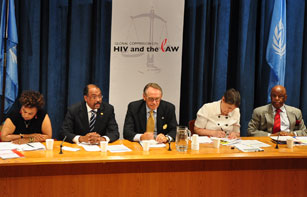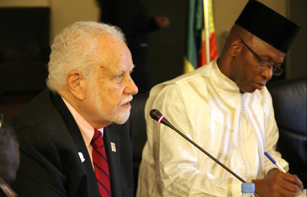
L to R: United States Congresswoman and member of the Global Commission on HIV and the Law, Barbare Lee; UNAIDS Executive Director Michel Sidibé; Deputy Secretary-General of the United Nations Jan Eliason; UNDP Administrator Helen Clark; and His Excellency Festus Mogae, former President of Botswana and member of the Global Commission on HIV and the Law.
Credit: D.Lowthian
The Global Commission on HIV and the Law launched its landmark report on 9 July 2012 at UN Headquarters in New York. The new report denounces the detrimental impact that punitive laws have on human rights and the HIV response and makes bold recommendations for addressing them.
“Never before has there been such an examination of the role of law in HIV,” said Festus Mogae, Former President of Botswana and member of the Commission. “What we have found is an epidemic of bad laws that is costing lives. We must end the epidemic of bad laws and enact laws based on evidence, common sense and human rights,” added Mr Mogae.
Stigma, discrimination and punitive legal approaches have long been recognized as barriers to the HIV response. They heighten vulnerability to HIV especially among key populations at higher risk of infection and make it difficult for individuals and communities to access HIV prevention, treatment, care and support services. UNAIDS has long called for the removal of punitive laws and their replacement with protective ones. Yet, countries across the world still maintain laws, policies and practices that infringe upon human rights, fuel discrimination and prevent global and national efforts to address HIV.
Speaking at the launch of the report, UNAIDS Executive Director Michel Sidibé noted that “the strength of this report is that it goes beyond a superficial description of stigma and discrimination to question the legal and structural fabrics that sustains inequality, injustice and human rights violations in the context of HIV”.
The report titled “HIV and the Law: Risks, Rights and Health” is a result of a two-year consultative process during which the Commission received more than 1 000 submissions from people affected by laws, law enforcement and access to justice issues in the context of HIV. The report took into account recommendations from 7 regional dialogues involving governments and civil society, and the input from a Technical Advisory Group of experts on HIV and the law.
Punitive laws increase risk of HIV infection
The Commission—an independent group of political and social leaders from around the world—pointed out that women in many parts of the world are governed by plural legal systems where traditional and customary law perpetuates their social and economic inequality. This situation makes women vulnerable to relationships and/or sexual violence which put them at risk of HIV infection. The Commission described the realities of many pregnant women living with HIV who face discrimination in health care including forced sterilization, even though simple and inexpensive medicine can prevent mother-to-child HIV transmission and keep mothers alive.
In the report, Commissioners called on governments to use the law to protect women from inequality and violence. They also urged governments to end legal barriers that prevent young people from accessing HIV information and services, as well as sexuality education—all necessary to avoid HIV infection.
The Commission also called for the removal of laws that criminalize people on the basis of their sexual orientation and gender identity, possession of drugs for personal use, and engagement in adult consensual sex work. It cited extensive evidence of how such criminal laws exacerbate risk of HIV infection among men who have sex with men, transgender people, people who use drugs and adults who sell and buy sex. According to the report, such laws drive people underground and into the margins of society away from health and HIV services. Furthermore, if convicted and sent to prison, the risks of contracting HIV, TB and Hepatitis C are very high because, in many countries, laws prohibit the provision of health and HIV prevention services and commodities in prisons.
We must end the epidemic of bad laws and enact laws based on evidence, common sense and human rights
Festus Mogae, Former President of Botswana and member of the Global Commission on HIV and the Law
Nick Rhoades from the Center of HIV Law and Policy spoke against the criminalization of HIV exposure and transmission, having himself been convicted in the United States of America, even though he had used condoms, had an undetectable viral load and did not transmit HIV. Citing the many HIV specific criminal laws, he said: “People have hands and can hit each other with their fists, but you don’t see a law specifically criminalizing a hand as a ‘deadly weapon’ like HIV is.” The Commission has called for the criminal law to be strictly limited to the malicious and intentional acts of actual transmission of HIV.
Participants at the launch highlighted how punitive legal approaches are undermining the investment in HIV prevention and treatment that is finally beginning to show the real possibility of halting and reversing the epidemic. They underlined that the persistence of punitive laws and practices is a serious concern at a time when the world has stabilized new HIV infections, increased its knowledge on effective HIV prevention and is preparing to harness the full potential of expanded HIV treatment. “It is outrageous that in 2012, when we have everything we need to beat this epidemic, we still must fight prejudice, discrimination, exclusion and bad laws,” said Mr Sidibé.
Law as an instrument to protect individuals
Commissioners at the launch underlined that there are many positive examples of countries that have used the law as an instrument to protect individuals, to create an environment that addresses stigma and violence thus encouraging access to HIV services. Other countries have used the law to challenge overly broad and stringent intellectual property regimes to reduce the cost of essential HIV medicines and to ensure their availability including through the production of generics.
“Law reform is complex, but countries can do much more,” said UNDP Administrator Helen Clark. “The task before us is to ensure better laws are adopted and enacted,” she added.
The Commission and its work have started dialogues across the world on issues that are difficult, controversial and complex. They are also issues that are central to human dignity, health and social justice. These dialogues are part of what Governments committed to do in the 2011 Political Declaration on AIDS where they pledged to review laws and policies that “adversely affect the successful, effective and equitable delivery of HIV services and consider their review”.
“We now have a powerful tool for advocacy and engagement to ask governments to uphold human rights for all people vulnerable to HIV,” said Ebony Johnson of the Athena Network. “This report should not be shelved.”
The Global Commission on HIV and the Law is an independent body, convened by the United Nations Development Programme (UNDP) on behalf of the Joint United Nations Programme on HIV/AIDS (UNAIDS). The Commission was supported by a Technical Advisory Group, which reviewed and analyzed existing public health and legal evidence and also commissioned original analysis. Additional information on the Commission, its processes and work is available at www.hivlawcommission.org.











